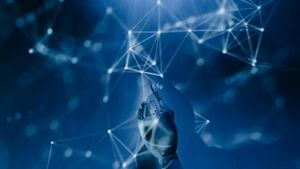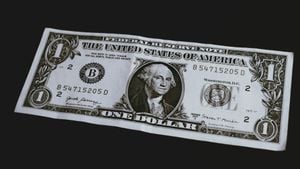The Nobel Prize, the gold standard of scientific recognition, finds itself at an inflection point, confronting significant quandaries about its relevance amid the rapidly changing scientific landscapes. This reality struck deep this year during the award announcements, sparking fresh debates about not just who gets nominated and who wins but also what qualifies as groundbreaking contributions to science.
The conversation dates back to the distinctive but overlapping realms of scientific disciplines, particularly the tension between traditional fields like physics and chemistry and the growing blend of disciplines, especially biochemistry and artificial intelligence (AI). This notion was glaringly evident during the announcement of this year's awards, provoking reactions traditionally seen within the scientific community. Were the nominees representing the core tenets of chemistry and physics, or were they merely taking credit for advancements made possible by AI technologies?
Earlier discussions had led to heated exchanges over whether contributions to these prize-winning discoveries belonged strictly to the domains of chemistry and physics or could also include these new-age technologies blurring traditional boundaries. For many, the conundrum was simple—one could not ignore how AI now plays a large role in utilizing chemistry and physics.
At the intersection of scientific disciplines, David Baker from the University of Washington shared the recent Chemistry Nobel. His work on computational tools allowing scientists to design proteins with innovative shapes and functions has revolutionized our comprehension of proteins, often referred to as the machine builders of life. His achievement, announced this year, follows closely on the heels of previous Nobel recognition awarded to AI-driven protein structure predictions—an indication of just how quickly these new methodologies are being integrated and recognized within traditional frameworks.
Just years ago, the conversation about what even constitutes chemistry was extruded through the lens of those who argued over the legitimacy of biochemistry. Some traditional chemists railed against the perceived dilution of their field as more researchers began to embrace inter-disciplinary approaches, bridging gaps between chemistry, biology, and computer science.
Fast forward to the current era, where discussions surrounding Nobel nominees crescendo back to the roots of what defines these award categories. One might wonder, what do we define as 'revolutionary' science when AI possibilities stand at the helm?
Indeed, the debates became particularly vociferous when Geoffrey Hinton, who shared this year’s Nobel Prize for Physics, pointed out significant dissonance between traditional sciences and modern technological applications. Renowned for his contributions to AI and neural networks, Hinton highlighted the concept of 'backpropagation,' which transformed machine learning by allowing systems to improve through iterative data feedback. A method, as he noted, not directly tethered to the physics theories upon which his Nobel was based. The reality underpinning this award illuminates the challenging task for the Nobel committee to categorize achievements entangled deeply with technological advancements.
This scenario raises pivotal questions about the future of Nobel recognitions. Historically, significant shifts or breakthroughs often came from foundational theoretical work, underscoring the empirical research riding along scientific evolutions. Yet, as observed, laureates this year leaned heavily on AI systems, challenging traditional definitions of scientific accomplishment.
Further, the earlier paradigm of separating scientific fields blur as researchers find themselves more frequently intersecting their expertise with technology, especially AI. Questions spiral around whether recognition via prestigious awards can adapt rapidly enough to catch up with the pace of scientific innovation. Are we entering a new paradigm where AI serves not only as the tool of analysis but also the very architect of discovery?
This progression suggests a nuanced reevaluation of accolades might become necessary. Can the significance of AI-led advancements generate Nobel-worthy accolades when the sole contribution could be the creation of models for molecular structures rather than the actual discovery of new compounds?
This year’s Nobel winners’ work blends layers of expertise across the spectrum of scientific disciplines. While there are consensus accolades like the Turing Award for contributions to computer science and the Fields Medal for mathematics, critics assert these do not hold the cultural weight of the Nobel Prize. This intellectual heft invariably lends serious consequence and respect to the prize itself, reinforcing the nuanced gravity implied when AI-authored research earns higher recognition.
Many scientists frequently refer to the pushing boundaries of their fields, challenging parameters intertwined with traditional academia. And yet the distinction between groundbreaking work and derivative tool creation is not always clear-cut. The prevailing concern among observers is the chilling prospect—what if scientists become creators of pathways for AI to make discoveries without fully grasping the underlying processes?
Although the Nobel Prizes represent significant achievements deserving of celebrated acknowledgment, there lurks apprehension over the erosion of perceived discovery roles. It beckons the larger discourse of whether researchers will maintain their roles as primary innovators or merely become the artisans, crafting the tools of advancement instead of actively engaging the molecular building blocks defining their sectors.
The depth of sentiment shared by the scientific community speaks volumes. Many argue these debates over the nature of the awards hint at broader societal shifts, reliant upon AI-driven technologies affecting scientific dialogues and future research allocations. Several researchers have emphasized how AI, having permeated scientific discourse, serves simultaneously as both ally and adversary—a partner promising efficiency and speed but also presenting existential threats to traditional scientific roles.
Drawn out of the unique drama permeated by this year’s Nobel conversations is the acknowledgment of the rapidly changing nature of science itself. Can the Nobel Prizes adapt swiftly enough to accentuate traditional accomplishments amid experiences shaped by AI's significant influence on methodologies? With the ground shifting beneath our feet, it remains to be seen if future milestones will still stand proudly on the traditional podium of scientific triumph or blend seamlessly with new-age design paradigms upholding AI.



